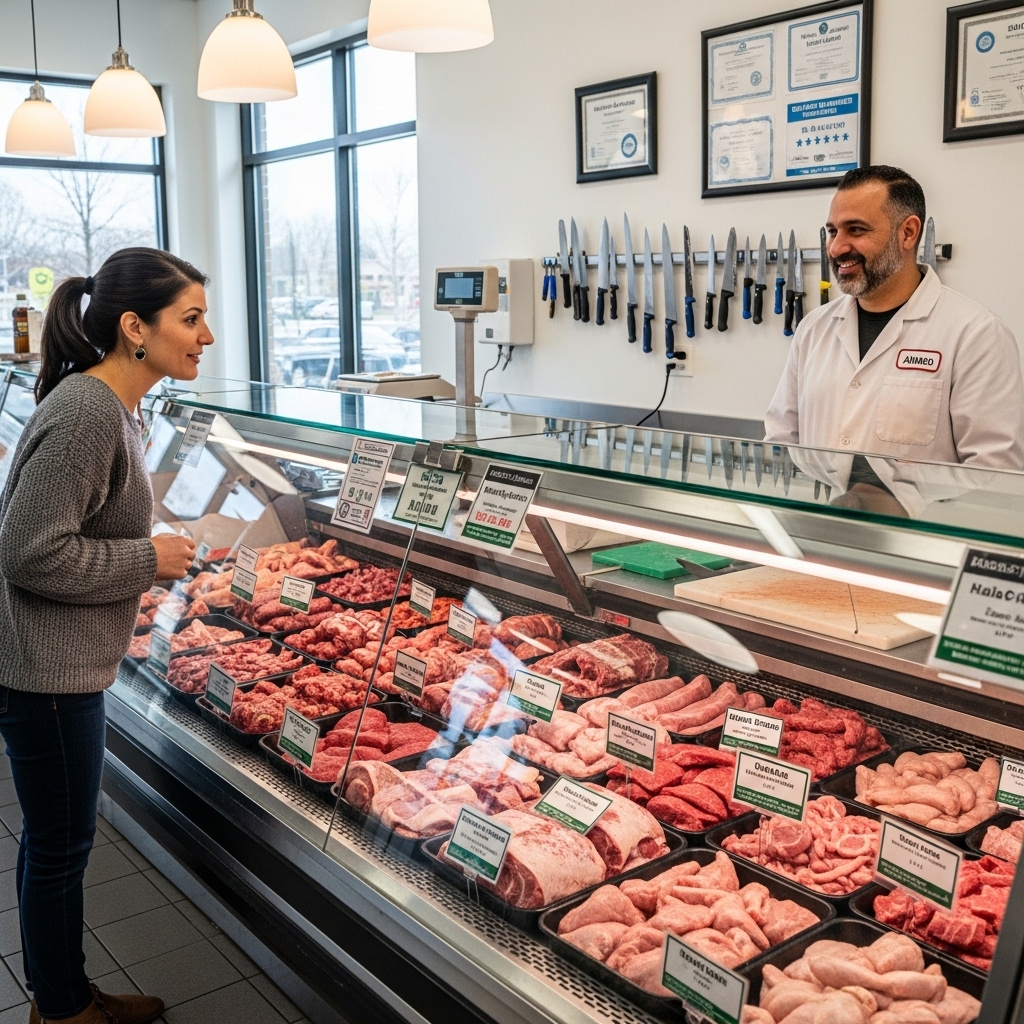Finding Halal Meat Near You in Naperville: A Clear, Friendly Shopper Guide
If you have ever typed “halal meat near me in Naperville, Illinois” and felt overwhelmed by choices, certifications, and unfamiliar cuts, you are not alone. Naperville is a diverse, food-loving community, and that means you can find quality halal meat if you know what to look for and where to start. This guide walks you through the essentials: what halal really means, how to evaluate stores and butchers, how to choose cuts for your favorite recipes, and how to shop with confidence. To jump straight to browsing popular grocery and butcher offerings in one convenient place, explore this curated selection of halal products and use the rest of this guide to shop smarter and cook better.
What “Halal” Means and Why It Matters
Halal, an Arabic word meaning “permissible,” refers to food prepared according to Islamic dietary guidelines. For meat, that includes the health and treatment of the animal, proper slaughter practices, and careful handling to avoid cross-contamination with non-halal items. In practice, halal standards promote both ethical sourcing and conscientious processing. When you shop in Naperville, look for clear labels, store signs, or certificates that indicate halal compliance. Some butchers display certificates from recognized authorities, while others emphasize transparency by letting customers ask questions, observe parts of the process, or review supplier information.
Beyond religious observance, many shoppers appreciate halal meat for its emphasis on cleanliness, traceability, and quality control. Reputable halal butchers treat freshness, hygiene, and consistency as non-negotiables. If you have dietary preferences such as avoiding certain additives, or you want to know more about animal welfare and handling, a high-quality halal market can be a valuable partner in your weekly meal planning.
Understanding Naperville’s Halal Landscape
Naperville’s shopping scene ranges from boutique butchers to full-service international markets. You may find standalone halal meat counters, butcher shops connected to small grocery stores, or larger markets with extensive halal aisles. Depending on your neighborhood, some locations are walkable, while others are a short drive. Proximity matters, but so does experience: a knowledgeable butcher who can answer questions about cuts, marbling, age of the meat, and cooking techniques can quickly turn a new shopper into a confident regular.
Because Naperville draws families and professionals from many backgrounds, demand for halal options has grown and diversified. You will encounter beef and lamb staples, but also goat, chicken, turkey, and specialty items like marrow bones and offal. During holidays or community celebrations, stores may stock expanded selections. Call ahead if you want something specific, as many butchers gladly prepare custom orders or set items aside for pickup.
How to Evaluate a Halal Butcher or Market
Not all stores are the same, and small details often make the difference. Use these tips to assess quality when you visit a halal market in Naperville.
- Look for clarity in labeling. Meat should be marked clearly as halal, with supplier names or certificates displayed. Ambiguous or missing signage is a red flag.
- Check cleanliness at a glance. A tidy case, clean cutting boards, and organized storage indicate good hygiene. Smells should be fresh, never sour or overly metallic.
- Ask about turnover. High turnover often means fresher meat. A busy case that is frequently restocked can signal consistent quality.
- Talk to the butcher. Friendly, informed staff can guide you toward the right cut and offer cooking tips. If they welcome questions, you are likely in good hands.
- Observe handling and separation. Halal meat should be processed and stored separately from non-halal products to prevent cross-contamination.
- Evaluate color and texture. Bright, natural color and firm texture are good signs. Excess liquid pooling in trays can be a sign of aging or suboptimal storage.
- Consider packaging. Vacuum-sealed or well-wrapped cuts preserve freshness. Labels should include cut names and, when applicable, grind ratios.
Popular Halal Cuts and What to Cook
Beyond ground beef and chicken breast, the halal butcher case offers a world of possibilities. For beef, consider chuck for stews, short ribs for braising, brisket for slow cooking, and sirloin for quick searing. Lamb shoulder and shanks are rich and forgiving for slow roasts, while lamb leg can be roasted whole or cut into steaks for the grill. Goat shoulder yields deep, aromatic curries and braises; bone-in cuts add extra flavor to broths. Chicken thighs, wings, and drumsticks remain economical and versatile for sheet-pan dinners, grilled skewers, or slow-cooked dishes.
International cuisines can inspire your menu: try lamb kofta patties, Pakistani-style nihari with beef shank, Moroccan tagines with bone-in lamb, Turkish kebabs from well-trimmed sirloin, or West African stews using goat. For weeknights, ground lamb or beef transforms into flavorful meatballs or stuffed peppers. Do not overlook offal and bones; liver, heart, and marrow bones are nutrient-dense and excellent for pâtés, rich stocks, and bone broths. A good butcher can trim, portion, or customize grinds to help you save time and reduce waste.
Smart Shopping Workflow for Busy Naperville Households
Consistency saves time and reduces decision fatigue. Try this approach to streamline your halal meat routine.
- Plan meals by protein category. Choose one each from chicken, beef, and lamb or goat for variety. This makes shopping faster and cooking more interesting.
- Pick signature cuts. For example, ground lamb, chicken thighs, and beef chuck cover countless recipes. Rotate a fourth “explore” cut weekly to keep things fresh.
- Shop with timing in mind. If you prefer fresher deliveries, ask staff which days they receive shipments. Build your weekly trip around those windows.
- Buy for the freezer in labeled portions. Freeze in meal-size bags and note the cut and date. Thaw in the refrigerator overnight.
- Stock pantry partners. Keep spices, onions, garlic, tomatoes, and grains on hand so meat becomes the only variable. Meal prep becomes effortless.
When you want inspiration or a convenient view of what local markets often carry, browse a curated halal grocery and butcher assortment right from your phone. In the middle of the week, it can be a time saver to check a broad range of halal products and build a quick shopping list around what looks appealing for grilling, roasting, or slow cooking.
Food Safety, Storage, and Freezing Tips
Proper handling preserves quality and flavor. Transport meat home in insulated bags during warm weather. Refrigerate or freeze promptly; raw poultry should be cooked within a couple of days, while beef and lamb often allow a slightly longer window. Freeze in flat, stackable packages to speed thawing and save space. Label everything with the cut name and date, and rotate stock so older items are used first. Thaw in the refrigerator whenever possible. If you need a quick thaw, submerge sealed packages in cold water and change the water every 30 minutes. Cook thawed meat promptly and avoid refreezing unless it was thawed in the fridge and remained cold.
Avoid cross-contamination by using separate cutting boards for raw meat and ready-to-eat foods. Sanitize surfaces and wash hands thoroughly. Cook to safe internal temperatures, and rest larger roasts so juices redistribute. Leftovers should be cooled quickly and stored in shallow containers. Reheat gently to avoid drying out lean cuts like chicken breast.
Cooking Techniques That Showcase Halal Meat
Grilling excels with well-marbled cuts and skewered cubes of lamb or beef. Marinate for flavor and tenderness, then grill over medium-high heat to develop a char while keeping the center juicy. For braises and stews, brown meat first, then simmer slowly with aromatics. Pressure cookers shorten the timeline while preserving depth. Roasting works beautifully for bone-in legs or shoulders; use a meat thermometer and baste occasionally. Pan searing suits steaks and chops, while stir-frying calls for thinly sliced cuts across the grain. Do not underestimate slow cookers; they are forgiving for tougher cuts and ideal for busy days.
Balance spice blends with acidity (lemon, vinegar, yogurt) and freshness (herbs). Pair lamb with cumin, coriander, and mint; beef with paprika, garlic, and thyme; chicken with turmeric, ginger, and citrus. For goat, consider warm spices like cinnamon and clove layered with chiles and tomato. Serve with rice, flatbreads, roasted vegetables, or crisp salads. With the right cut and technique, weeknight meals feel special without demanding hours of attention.
Budgeting Without Compromising Quality
Even without quoting numbers, there are strategies to shop wisely. Choose cuts that deliver more flavor per ounce when slow-cooked, such as beef chuck or lamb shoulder. Buy whole chickens and break them down yourself for multiple meals. Ask your butcher about value cuts like top round for slicing or stew meat for curries. Use bones for stock to stretch your grocery investment across soups and sauces. Plan batch cooking sessions that turn one shopping trip into multiple dinners and lunches, reducing impulse buys and waste.
Another strategy is learning to portion accurately. For example, plan proteins by the number of meals rather than by weight, and complement with legumes, seasonal vegetables, and grains. This approach keeps your pantry versatile and your freezer organized, helping you enjoy premium quality while staying efficient with your household food budget and time.
Seasonal and Community Considerations
Naperville’s seasons influence cooking styles. In summer, outdoor grills and quick marinades take center stage, while winter invites long-simmered stews and oven roasts. During Ramadan and Eid, halal markets may stock expanded selections of lamb, goat, and special cuts suited for large gatherings. Planning ahead ensures you get the exact items you want, whether that is a bone-in lamb leg for slow roasting or skin-on chicken pieces for traditional family recipes. Ask staff about special orders or recommendations for holiday menus; they often have clever tips from years of serving local families.
Community events can also point you toward good markets and butchers. Neighbors often share where they buy certain cuts, and word-of-mouth matters for specialty items. If you attend local gatherings, pay attention to dishes that impress you and ask the cook which cut and technique they used. A small conversation can turn into your new favorite weeknight routine.
Common Mistakes and How to Avoid Them
- Buying unfamiliar cuts without a plan. Ask your butcher how to cook a new cut, or look up techniques before you commit.
- Skipping questions about freshness. Simple questions like “When was this ground?” or “What day do you receive deliveries?” can improve your results dramatically.
- Overcooking lean cuts. Use a thermometer and pull meat early; carryover heat continues cooking.
- Under-seasoning. Halal meat shines with bold spices and aromatics. Taste and adjust as you go.
- Ignoring rest time. Resting roasted and grilled meats preserves juiciness.
- Cluttered freezer practices. Label everything and rotate stock to avoid forgotten bundles.
Frequently Asked Questions
Q: How can I verify that meat is truly halal? A: Look for visible certification, ask who the suppliers are, and inquire about handling procedures to prevent cross-contamination. Reputable stores are transparent and happy to explain their process.
Q: Is halal meat different in taste or texture? A: The taste depends more on the cut, animal diet, aging, and cooking method. Halal standards emphasize cleanliness and proper handling, which can help preserve natural flavor.
Q: What are must-try cuts for beginners? A: Start with chicken thighs, beef chuck, and lamb shoulder. They cook forgivingly and deliver rich flavor whether grilled, roasted, or braised.
Q: Can I request custom cuts? A: Yes. Many Naperville butchers will trim fat, cut thicker or thinner steaks, prepare stew cubes, or grind to a specific ratio. Call ahead for specialty requests.
Q: How should I store meat safely? A: Keep it cold, separate from ready-to-eat foods, and use airtight packaging. Freeze extras in labeled, flat portions to save space and speed thawing.
Q: What if I am new to cooking with lamb or goat? A: Ask for guidance on ideal cuts for slow cooking. Start with shoulder or shanks, which become tender and flavorful in braises and stews.
Q: Are pre-marinated options a good idea? A: They can be convenient, but check ingredient lists if you have dietary preferences. Alternatively, ask for an appropriate cut and marinate it yourself at home.
Q: How do I plan for family meals? A: Pick a weekly mix of proteins, prep in batches, and cook once for multiple meals. This keeps variety high without extra effort.
Ready to Shop and Cook Better in Naperville
If you are ready to simplify your weekly routine, choose a nearby halal market, talk to the butcher, and select cuts that match your cooking style. Start with a few reliable favorites, add one new cut each week, and build confidence with every meal. For extra convenience, preview a broad, thoughtfully organized range of halal products, create your list, and head to your preferred store with a plan. With a practical approach and a trusted halal butcher in Naperville, you will turn weeknight cooking into a satisfying habit that suits your taste, schedule, and values.




